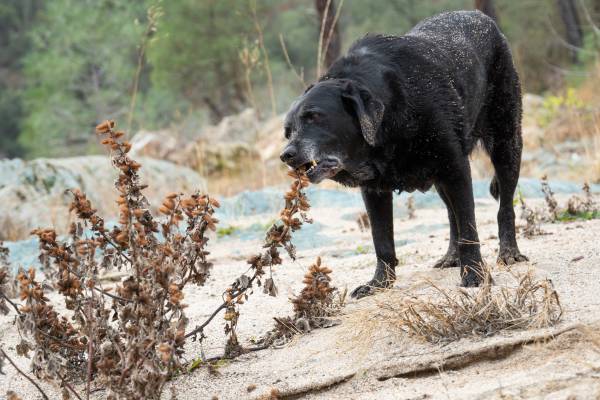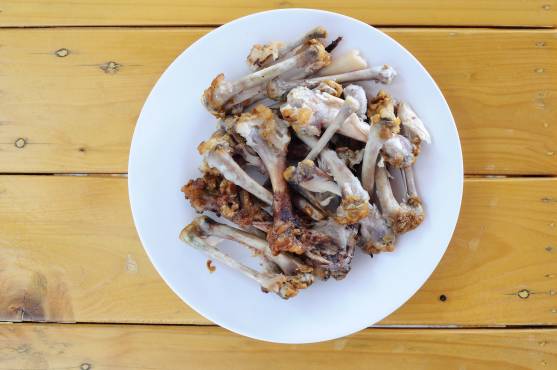Connect with a verified veterinarian in minutes. Licensed vets are available 24/7 to answer your questions. No need to worry about your furry family member.
Burrs are a nuisance, especially if you happen to walk into a patch filled with them. These pesky things stick to your clothing and socks. They can be almost impossible to remove. These awful things can also become stuck in a dog’s fur, where they’re hard to remove. But what happens if a dog eats a burr?
Has your dog eaten a burr? Are you worried the burr will make your dog sick? If so, you’ve come to the right place. We understand it can be scary when your dog eats something like this.
We’ve gathered some information about burrs and whether they can make a dog sick. Let’s get started!
What is a Burr?
A burr is a seed pod or dried fruit that has hooks or “teeth.” Nature’s made burrs to be excellent at moving to new places. The hooks of the burr can become lodged in the fur of passing animals. If the animals scrape or bite the burr off, its seeds can disperse into a new area.
The hooks of the burr were also developed to keep animals from eating the seeds. The burr is highly effective at attaching itself to fur, clothing, hair, and more.
Dogs and other animals can have a lot of trouble removing burrs some their fur, feet, and other body parts. But what happens if a dog eats a burr?
Burrs & Dogs
Unfortunately, burrs can make a dog sick. One of the first things a burr can do is cause injuries in a dog’s mouth. The hooks and spines on the burr are very dry and sharp. It’s possible they can puncture or tear tissue in the mouth.
Another problem is that burrs can also become lodged in the dog’s esophagus. When this happens, the burr causes major irritation that can lead to unpleasant symptoms for the dog.
Finally, a burr may also irritate the tissues of the digestive system.
Dogs usually don’t eat burrs on purpose. Who would? However, if a dog has a burr caught in his fur, he will use his teeth to remove it (if possible). This way, a dog could accidentally swallow the burr and then get sick.

Review symptoms, medications & behavior to keep your pets healthy with a Vet Online in just minutes.
Ask a Vet Live NowSymptoms of Burr Ingestion in Dogs
You may notice these symptoms if your dog has eaten a burr:
Burr is caught in the throat:
- Gagging
- Vomiting
- Choking
- Coughing
Burr is caught in the digestive system
- Bleeding in the mouth
- Licking lips repeatedly
- Wounds on the dog’s face
- Discomfort when eating or drinking
- Loss of appetite
- Increase in aggression (due to pain)
If you notice choking symptoms in your dog, call the vet immediately. This may be an emergency.
For the other symptoms, it’s highly recommended that you call the vet right away.
Treatment for Burr Ingestion in Dogs
If your fur baby is not choking but is showing other symptoms, the vet may ask you to monitor your dog’s symptoms for a few hours. If they worsen, the vet will ask you to bring your canine companion in to be checked.
When the vet asks you to monitor your dog’s condition, they may also suggest feeding canned pumpkin (not the kind used to make pies). The pumpkin is high in fiber but soft, making it easy to eat. The canned pumpkin may cause the burr to become dislodged and pass safely out in your dog’s poop.
However, this method may not work, and your fur baby will need to see the vet for treatment.
The prognosis is best for dogs who receive prompt medical treatment after eating a burr. However, most dogs will make a full recovery after this experience!
Connect with a verified veterinarian in minutes. Licensed vets are available 24/7 to answer your questions. No need to worry about your furry family member.

Kim
Kim is a talented author, who loves animals especially dogs. She engaged in writing books and articles relating to animals a decade ago. Kim resides in Chicago with her husband and son. The family is the proud owner of a dog and a parrot (Jack and Lily). Kim wanted more than these two pets, but her husband put his foot down... She often visits elementary schools to talk to the kids about what she learned about pets and how they could learn from them.
Review symptoms, medications & behavior to keep your pets healthy with a Vet Online in just minutes.
Ask a Vet Live Now





